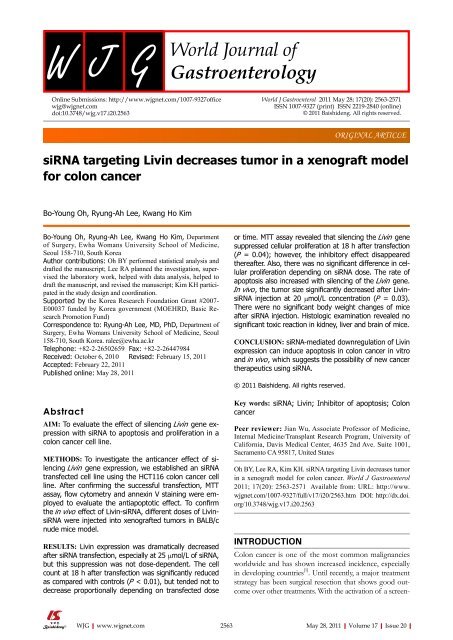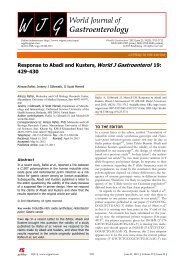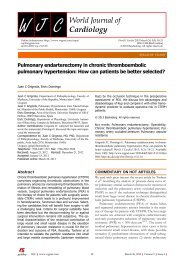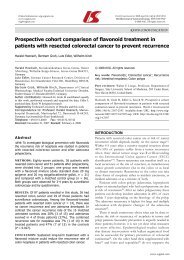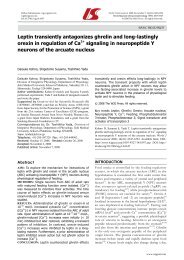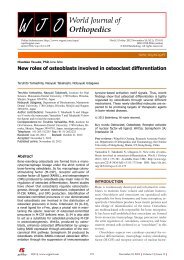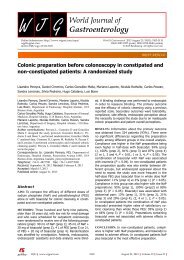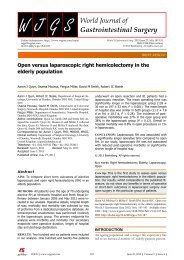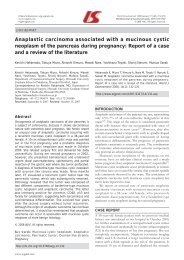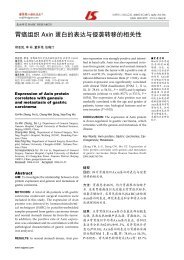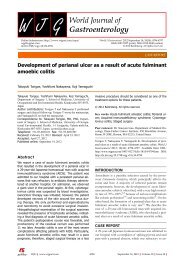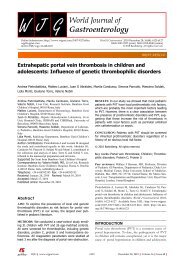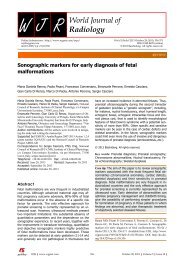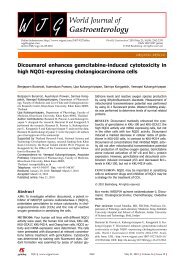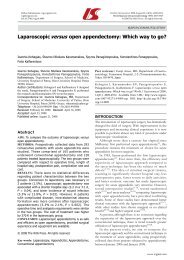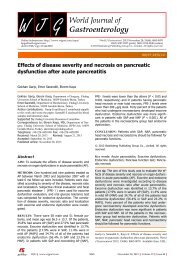20 - World Journal of Gastroenterology
20 - World Journal of Gastroenterology
20 - World Journal of Gastroenterology
You also want an ePaper? Increase the reach of your titles
YUMPU automatically turns print PDFs into web optimized ePapers that Google loves.
Online Submissions: http://www.wjgnet.com/1007-9327<strong>of</strong>fice<br />
wjg@wjgnet.com<br />
doi:10.3748/wjg.v17.i<strong>20</strong>.2563<br />
ORIGINAL ARTICLE<br />
siRNA targeting Livin decreases tumor in a xenograft model<br />
for colon cancer<br />
Bo-Young Oh, Ryung-Ah Lee, Kwang Ho Kim<br />
Bo-Young Oh, Ryung-Ah Lee, Kwang Ho Kim, Department<br />
<strong>of</strong> Surgery, Ewha Womans University School <strong>of</strong> Medicine,<br />
Seoul 158-710, South Korea<br />
Author contributions: Oh BY performed statistical analysis and<br />
drafted the manuscript; Lee RA planned the investigation, supervised<br />
the laboratory work, helped with data analysis, helped to<br />
draft the manuscript, and revised the manuscript; Kim KH participated<br />
in the study design and coordination.<br />
Supported by the Korea Research Foundation Grant #<strong>20</strong>07-<br />
E00037 funded by Korea government (MOEHRD, Basic Research<br />
Promotion Fund)<br />
Correspondence to: Ryung-Ah Lee, MD, PhD, Department <strong>of</strong><br />
Surgery, Ewha Womans University School <strong>of</strong> Medicine, Seoul<br />
158-710, South Korea. ralee@ewha.ac.kr<br />
Telephone: +82-2-26502659 Fax: +82-2-26447984<br />
Received: October 6, <strong>20</strong>10 Revised: February 15, <strong>20</strong>11<br />
Accepted: February 22, <strong>20</strong>11<br />
Published online: May 28, <strong>20</strong>11<br />
Abstract<br />
AIM: To evaluate the effect <strong>of</strong> silencing Livin gene expression<br />
with siRNA to apoptosis and proliferation in a<br />
colon cancer cell line.<br />
METHODS: To investigate the anticancer effect <strong>of</strong> silencing<br />
Livin gene expression, we established an siRNA<br />
transfected cell line using the HCT116 colon cancer cell<br />
line. After confirming the successful transfection, MTT<br />
assay, flow cytometry and annexin V staining were employed<br />
to evaluate the antiapoptotic effect. To confirm<br />
the in vivo effect <strong>of</strong> Livin-siRNA, different doses <strong>of</strong> LivinsiRNA<br />
were injected into xenografted tumors in BALB/c<br />
nude mice model.<br />
RESULTS: Livin expression was dramatically decreased<br />
after siRNA transfection, especially at 25 μmol/L <strong>of</strong> siRNA,<br />
but this suppression was not dose-dependent. The cell<br />
count at 18 h after transfection was significantly reduced<br />
as compared with controls (P < 0.01), but tended not to<br />
decrease proportionally depending on transfected dose<br />
WJG|www.wjgnet.com<br />
2563<br />
<strong>World</strong> J Gastroenterol <strong>20</strong>11 May 28; 17(<strong>20</strong>): 2563-2571<br />
ISSN 1007-9327 (print) ISSN 2219-2840 (online)<br />
© <strong>20</strong>11 Baishideng. All rights reserved.<br />
or time. MTT assay revealed that silencing the Livin gene<br />
suppressed cellular proliferation at 18 h after transfection<br />
(P = 0.04); however, the inhibitory effect disappeared<br />
thereafter. Also, there was no significant difference in cellular<br />
proliferation depending on siRNA dose. The rate <strong>of</strong><br />
apoptosis also increased with silencing <strong>of</strong> the Livin gene.<br />
In vivo, the tumor size significantly decreased after LivinsiRNA<br />
injection at <strong>20</strong> μmol/L concentration (P = 0.03).<br />
There were no significant body weight changes <strong>of</strong> mice<br />
after siRNA injection. Histologic examination revealed no<br />
significant toxic reaction in kidney, liver and brain <strong>of</strong> mice.<br />
CONCLUSION: siRNA-mediated downregulation <strong>of</strong> Livin<br />
expression can induce apoptosis in colon cancer in vitro<br />
and in vivo, which suggests the possibility <strong>of</strong> new cancer<br />
therapeutics using siRNA.<br />
© <strong>20</strong>11 Baishideng. All rights reserved.<br />
Key words: siRNA; Livin; Inhibitor <strong>of</strong> apoptosis; Colon<br />
cancer<br />
Peer reviewer: Jian Wu, Associate Pr<strong>of</strong>essor <strong>of</strong> Medicine,<br />
Internal Medicine/Transplant Research Program, University <strong>of</strong><br />
California, Davis Medical Center, 4635 2nd Ave. Suite 1001,<br />
Sacramento CA 95817, United States<br />
Oh BY, Lee RA, Kim KH. siRNA targeting Livin decreases tumor<br />
in a xenograft model for colon cancer. <strong>World</strong> J Gastroenterol<br />
<strong>20</strong>11; 17(<strong>20</strong>): 2563-2571 Available from: URL: http://www.<br />
wjgnet.com/1007-9327/full/v17/i<strong>20</strong>/2563.htm DOI: http://dx.doi.<br />
org/10.3748/wjg.v17.i<strong>20</strong>.2563<br />
INTRODUCTION<br />
Colon cancer is one <strong>of</strong> the most common malignancies<br />
worldwide and has shown increased incidence, especially<br />
in developing countries [1] . Until recently, a major treatment<br />
strategy has been surgical resection that shows good outcome<br />
over other treatments. With the activation <strong>of</strong> a screen-<br />
May 28, <strong>20</strong>11|Volume 17|Issue <strong>20</strong>|


